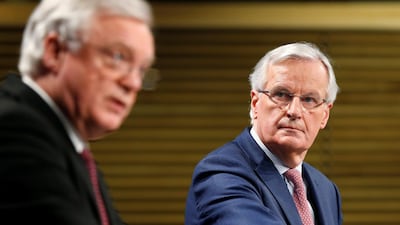Britain and the EU agreed the terms for a transition period after Brexit yesterday, sending the pound soaring to a three-week high against the dollar.
Sterling rose as much as 1 per cent to $1.4088 yesterday, its highest intraday-rise in over five weeks, after Brexit secretary David Davis and chief EU negotiator Michel Barnier hailed a “decisive step” forward in the talks. Against the Euro, the pound pushed to its highest level since January, rising as much as 0.8 per cent.
“Today’s moves show that Brexit still leaps to the front of the queue and becomes the main driver for sterling, but there will be other factors at play this week," said Connor Campbell, an analyst at Spreadex Markets.
"It will be interesting to see if the pound can hang onto any of today’s gains," he said, with interest rate decisions in the US and the EU slated for later this week, along with UK wage and inflation data.
EU leaders are expected to sign off on the agreement at a summit on Thursday and Friday, clearing the way for a 21-month transition period that will start on Brexit day on 29 March 2019 and will last until December 31 2020. During this time, there will be little change in trading between the UK and the EU bloc, something that businesses have been calling for to ease them into the post-Brexit era.
In addition to announcing the transition deal, Mr Davis and Mr Barnier said also progress had been made on the broader withdrawal treaty, with the former insisting that a good deal was now closer than ever.
But several issues remain unresolved, including the question of the Northern Ireland border. The two sides agreed yesterday that there needed to be a “backstop” plan to avoid a hard border with Ireland, but remain divided on what form a future border will take.
_______________
Read more:
Brexit transition deal struck after Brussels talks
In setback to May Unilever ditches London for Rotterdam
Car makers warn of potentially disastrous Brexit as EU and UK sign agreement
_______________
"We agreed today that the backstop solution must form part of the legal text of the withdrawal agreement," Mr Barnier told reporters after the draft agreement was published, AFP reported.
To get this far the UK had to make concessions where it vowed to fight earlier this year. It has backed down on the rights of citizens coming to the UK after Brexit day, and has accepted a slightly shorter transition period than the one it originally wanted.
The reaction from British businesses to Monday’s announcement was mixed, with some business leaders expressed concerns that the transition agreement won’t be legally binding until the final withdrawal treaty is signed early next year. Mr Barnier reminded reporters on Monday that “nothing is agreed until everything is agreed”.
Allie Renison, Head of Europe & Trade Policy at Britain's Institute of Directors warned: "We hope that the EU summit this week will not be seen as an opportunity for political leaders to muddy the waters of this deal as agreement on transition is vital for businesses across Europe.
"We are, however, concerned that not enough attention is being given now to the finer details and practical implications of transition. Many businesses will only be able to sufficiently plan and prepare for Brexit once the precise details of the future relationship are known, and any changes to domestic infrastructure like customs have been implemented."
Adam Marshall, chief of the British Chambers of Commerce, struck a more positive tone, describing Monday’s announcement is a "milestone" that many UK businesses have been waiting for.
"The agreement of a status quo transition period is great news for trading firms on both sides of the Channel, as it means that they will face little or no change in day-to-day business in the short-term," he said, according to Reuters.
“While some companies would have liked to see copper-bottomed legal guarantees around the transition, the political agreement reached in Brussels is sufficient for most businesses to plan ahead with a greater degree of confidence.”

